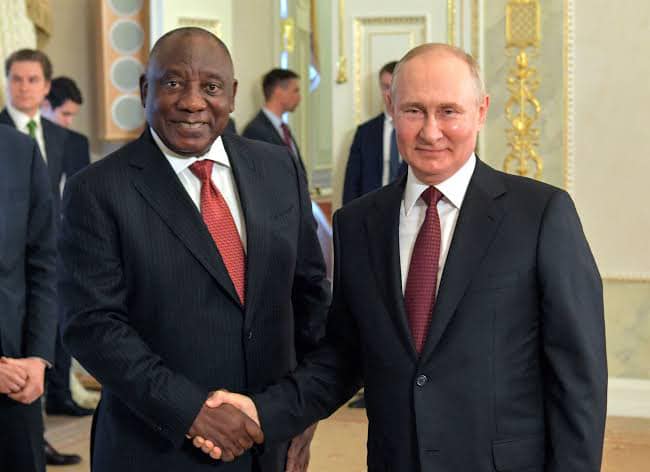By Denis Jjuuko
Six African presidents or their representatives flew to Ukraine and Russia allegedly to broker peace. Russia invaded Ukraine more than a year ago plunging Europe into another war. They indeed met the leaders of the warring parties but not before some embarrassing moment.
The South African president’s security detail and media were stranded in Warsaw when the Polish authorities kept them on the plane for more than 24 hours after landing. An uncalled-for embarrassing moment for Africa’s third biggest economy. If the Poles couldn’t allow security and media to get off their plane for a day, what kind of influence does Cyril Ramaphosa and his counterparts have to negotiate a peaceful agreement with Vladimir Putin? In the high stakes global war that is Russia and Ukraine, it is inconceivable that African leaders could negotiate peace. Perhaps they had gone on holiday.
While the six leaders were in Russia being serenaded by Putin’s charm and their delegations enjoying the eastern Europe weather, unknown assailants attacked a secondary school in western Uganda and killed 42 children, seriously wounded many and abducted others. Authorities blamed the Allied Democratic Forces (ADF) and some people fighting over the meagre funds supplied by Canadian donors to the school.
The eastern part of the Democratic Republic of Congo has never known peace. Foreign armies, private militias, rebel groups and even international peacekeepers call this area home. Thousands of people lucky to survive being killed in this endless crisis have ended up in internally displaced people’s camps or as refugees in neighbouring countries or elsewhere.
To access Europe, many African leaders avoided the burning airspace of Sudan fearing that their Gulf Stream private jets could be shot down by anti-aircraft missiles that could be fired at any time. Sudan is the epicenter of a senseless war where two erstwhile friends couldn’t agree on who how to share power or steal the country’s resources. It is hard to believe that many Sudanese have fled to Chad, of all places, for safety. Chad can’t govern itself.
The president of Senegal who came to power through a peaceful democratic process now doesn’t want to leave leading to demonstrations where security forces killed more than 16 protesters. In Somalia, Al Shabab filmed themselves as they attacked the Ugandan peace keepers, killing more than 50 of them. In Mozambique, it is the Rwanda army maintaining peace in some parts of the country. Libya has been at war since the Arab spring.
In Nigeria, Africa’s largest economy, Boko Haram abducts school going children without anyone stopping them.
As the African leaders were talking peace to the Russians and Ukrainians, thousands of Africans were being boarded on rickety boats to cross into Europe. Many don’t make the journey as their overloaded boats capsize.
Many of these people don’t want to go to Europe but they have been forced to seek refuge elsewhere. There are no jobs on the continent. You hardly hear African leaders meeting to discuss concrete steps they can take to create real jobs to help their young populations lead meaningful lives.
A year ago, some African leaders flew to Europe to beg Russia to allow ships carrying food to leave Ukraine ports. Africa, the continent that considers itself an agricultural one can’t feed its own people. It is Ukraine at war that can ship in food. With the current lack of commitment to agriculture, Africa will be importing food worth USD100 billion annually by 2030 according to the African Development Bank. With a population of 1.4 billion, food imports are expected to significantly rise. With every kilo of food imported, a few jobs are lost. These are the people who will be lured to slaughter innocent kids in dormitories in Kasese.
Talking of food, in East Africa, Kenya and Tanzania aren’t allowing each other to import or export maize leading to a long convoy of trucks at the Namanga border. Uganda and Kenya consistently blub over milk and eggs. Tanzania and Uganda squabble periodically over rice. As these non-tariff barriers are being set to deny or delay the movement of food, millions in East Africa starve to death.
African leaders can’t sit together to solve these problems. Once in a while, they fly to Addis, get booked into their presidential suites, drive down to the African Union headquarters and give wonderful long speeches. A communique is circulated with deadlines and timelines that everyone knows won’t be met. After they fly to their countries where a party of dancers and a queue of the most potbellied military officers is organized on the airport tarmac to welcome them back. And the circle continues.
When will Africa stop joking and get serious? How can people think that they can negotiate peace for Russia and Ukraine when they can’t solve a small border dispute over the importation of powdered milk?
The writer is a communication and visibility consultant. djjuuko@gmail.com










